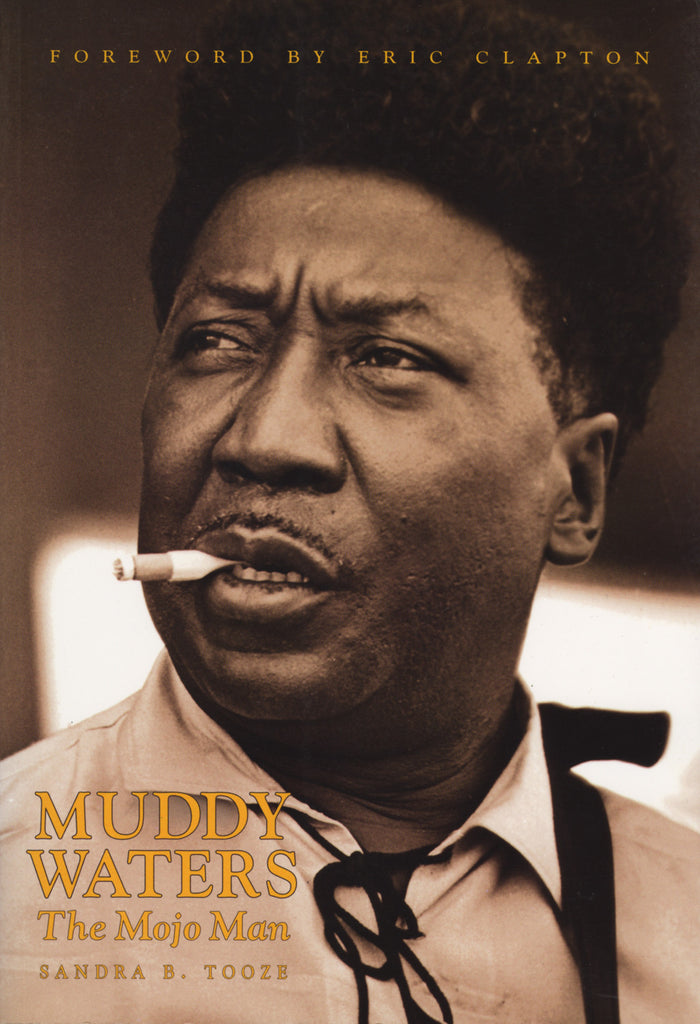
Muddy Waters: The Mojo Man
$23.95-
“Best blues biography of 1997” as awarded by Real Blues magazine. A sharecropper on a Mississippi plantation, a bootlegger, gambler, ladies’ man, and dynamic blues singer and guitarist — Muddy Waters’s life is traced in this original biography of the legendary blues man from the early twentieth century to his death in 1983. Interviews with key industry figures such as James Cotton, Willie Smith, Junior Wells, Jimmy Rogers, B.B. King, Bo Diddley, John Lee Hooker, and Marshall Chess prove to be a source of priceless anecdotes and lend substance and texture to Tooze’s compelling portrait of a blues pioneer.
A biography of the Blues King has been long overdue. This exhaustively researched account of the life of McKinley Morganfield—later renowned as Muddy Waters—begins with his birth in a Mississippi sharecropper’s cabin in 1915 and concludes with his funeral, held in 1983 at a Southside Chicago funeral parlor and attended by many of the leading lights of blues and rock.
This is a very personal saga. Sit in on virtually all of Muddy’s recording sessions, rollick with him in juke joints and ghetto taverns, travel with his band on the road, visit his home and family, hear the anecdotes of his bandmates and musical apostles. Join his fascinating journey from a sharecropper’s shack to the White House, from a Mississippi roadhouse to concert stages around the globe.
Sandra B. Tooze retraced the footsteps of a giant in her quest to discover the essence of Muddy Waters. In compiling her original research, she traveled to Mississippi and Chicago, and consulted with those who knew the great bluesman best. In addition to speaking with several members of Muddy’s family, she interviewed most of his bandmates, including Jimmy Rogers, Junior Wells, James Cotton, Francis Clay, Mojo Buford, Willie Smith, Bob Margolin, Jerry Portnoy, and more.
Ms. Tooze also talked to a long list of other well-known figures in the music world—such as B.B. King, John Lee Hooker, Bo Diddley, John Hammond, Chris Barber, Charlie Musselwhite, Koko Taylor, Elvin Bishop, Levon Helm, and Marshall Chess—who shared with her their stories of Muddy’s enduring influence on their lives.
Book Excerpt
At juke joints, frolics and fish fries, even at white folks’ functions, Muddy could pull in from two to three dollars a night blowing harmonica, significant money for a cropper who made 75 cents a day toiling in the fields. He sensed he was on the right track. He was gaining acclaim, the extra cash came in handy for a young man with a taste for smart clothes and pretty girls, and he was gaining exposure to other musicians and their styles of play. Muddy jammed with guitarist Robert Lee McCollum—later renowned as Robert Nighthawk—who was also a very good harp player. It’s likely he jammed with Eddie Boyd as well. Although he’d left Stovall by this time, Boyd had a steady gig playing piano at a juke joint on the edge of Clarksdale.
There’s no doubt Muddy had an enterprising nature. As well as laboring on the land and playing on Saturday nights and Sundays, the young man went fishing most Friday nights, probably in the teeming waters of the Old River, and he would sell his catch for Saturday fish fries before he went out to play.
It was prophetic that most of Muddy's favorite recording artists were guitar players. Watching Son Simms on guitar also inspired him. It was only a matter of time before he took a stab at it himself, eagerly taking pointers from Scott Bohanner and Simms. Muddy recalled constructing his own guitar at the age of 17: “Made mine out of a box and bit of stick for a neck. Couldn’t do much with it but you know, that’s how you learn.”
Later that year, in 1932, Muddy bought his first commercially made guitar. One story goes that to raise the necessary funds he sold his horse; more likely it was a mule. Nevertheless, he made $2.50 on the transaction, enough to buy a secondhand Stella from a man named Ed Moore.
Muddy’s appetite to master the guitar was voracious. Bohanner taught him to finger the basic chords, and Muddy tried to pick up what Scott was playing when they were out on gigs. “Those were great times,” Muddy reminisced. “I didn’t have no money in my pocket, but I had a ball.” He had an affinity for the instrument, and he practiced fingerpicking for one and a half to two hours every day. Among the first songs he learned were Leroy Carr’s “How Long Blues” and a tune written and recorded by the celebrated Mississippi Sheiks, “Sitting On Top of the World.”
Sandra B. Tooze is a freelance writer who lives in Toronto, Canada.
-
Published: July 1997
ISBN: 9781550222968
Dimensions: 6.75 x 9.75 in.
Pages: 384
